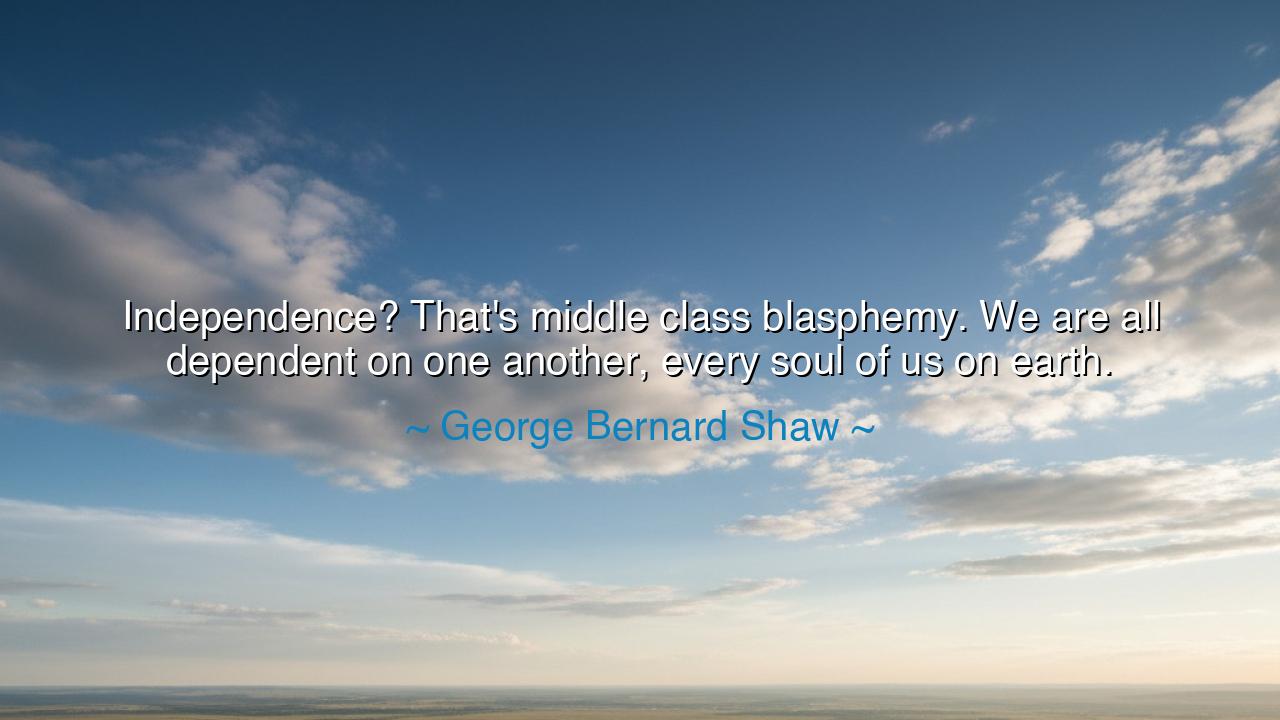
Independence? That's middle class blasphemy. We are all dependent
Independence? That's middle class blasphemy. We are all dependent on one another, every soul of us on earth.






When George Bernard Shaw declared, “Independence? That’s middle class blasphemy. We are all dependent on one another, every soul of us on earth,” he tore through one of the most cherished illusions of modern man—the illusion of self-sufficiency. With the sharp edge of his wit and the fire of his intellect, Shaw struck at the pride that blinds us to our shared humanity. His words remind us that no man, however gifted or wealthy, stands alone. The farmer depends on the rain, the builder on the stone, the artist on his audience, and all upon the quiet labor of those unseen. Dependence, far from being weakness, is the fabric of life itself, the invisible web that binds the hearts and hands of humankind together.
The origin of this declaration lies in Shaw’s deep critique of social hypocrisy. Living in the late nineteenth and early twentieth centuries, he watched as the rising middle class of industrial society exalted the notion of independence—the idea that through hard work and personal virtue alone, a man could claim full control over his destiny. But Shaw, a playwright and philosopher who understood the hidden machinery of society, saw the truth: that the wealth of one class is built upon the labor of another, that comfort is often paid for by invisible toil. To him, the boast of independence was not noble, but ignorant—blasphemy, as he called it, against the sacred interdependence of all souls.
To depend is not to be lesser, but to be human. Even the strongest warrior must drink from the river, and even the wisest sage must be taught to speak. Shaw’s words strip away the pride that makes man forget his neighbor. The very breath we draw comes from the green labor of the trees; the food we eat from hands we may never see. Civilization itself is a grand act of mutual service, each part sustained by another. The baker, the poet, the teacher, the healer—all are threads in the same divine tapestry. To deny our mutual dependence is to sever the bond that gives life its beauty, its order, and its meaning.
Consider the story of Florence Nightingale, the Lady with the Lamp. She is remembered as a figure of compassion and courage, tending to the wounded during the Crimean War. Yet her strength did not stand alone. Her mission was upheld by countless hands—the nurses she trained, the doctors who assisted her, the laborers who built hospitals, and the families who prayed from afar. Even the soldiers she served became her teachers in endurance and humility. Nightingale’s greatness lay not in isolation, but in her communion with others, her understanding that healing is not the work of one soul, but of many moving as one.
The ancients, too, knew this truth. The philosopher Marcus Aurelius wrote that man was made for cooperation, like the feet, the hands, and the eyelids—working in harmony, not in opposition. To fight this law of unity, he said, is to wound oneself. In every era, the proud have sought to raise walls of independence, to live as islands apart from the tide of humanity. Yet every empire built upon such arrogance has crumbled, while those founded upon fellowship—mutual aid, shared purpose, and compassion—have endured. For the strength of a nation, like the strength of a soul, lies not in separation, but in solidarity.
Shaw’s words, though sharp with irony, are rooted in moral tenderness. He reminds us that the cry of “I need no one” is a rebellion against reality itself. To acknowledge our dependence is not to confess weakness, but to embrace wisdom. It is the beginning of empathy, the soil from which all love and justice grow. When a man knows that he thrives only because others do, he begins to live not for himself, but for the common good. Such awareness turns selfishness into service and transforms society from a battlefield into a brotherhood.
The lesson is clear and timeless: cast aside the arrogance of false independence. Recognize the sacred truth that your life, your comfort, your very breath, are gifts woven from the lives of others. Offer gratitude, not pride. Extend your hand, not your judgment. Work not for yourself alone, but for the circle of humanity to which you belong. If you are strong, lift another; if you are weak, accept help without shame—for both acts are holy.
So, my children of the present age, remember this: we are all dependent upon one another, every soul of us on earth. The light you kindle may guide another; the kindness you receive may save you in turn. Do not seek the cold throne of independence, for it is built upon loneliness. Instead, dwell in the warmth of interdependence, where each life enriches the other. In that unity, you will find not only strength, but the deepest truth of all—that in serving one another, we serve the divine harmony that sustains the world.






AAdministratorAdministrator
Welcome, honored guests. Please leave a comment, we will respond soon